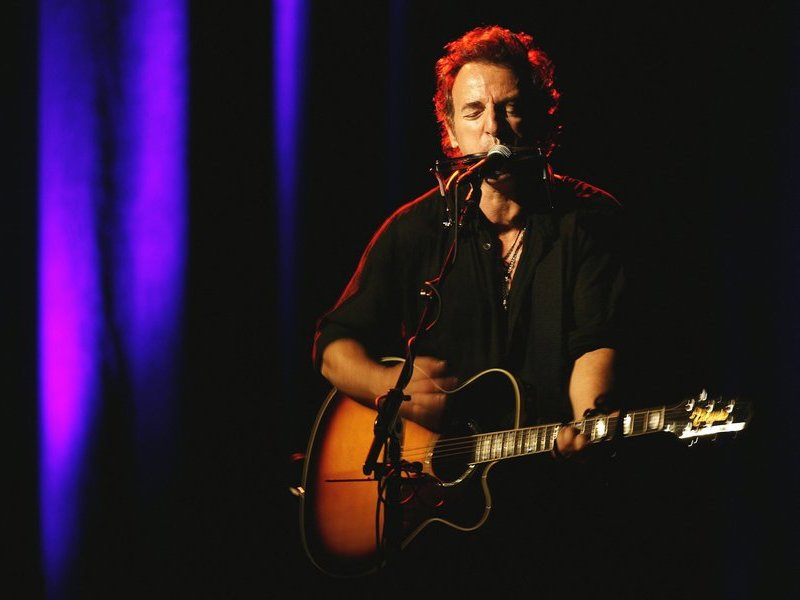It was 20 years ago today (August 17th, 2002) that Bruce Springsteen's post-9/11 requiem, The Rising, hit Number One on the Billboard 200 albums charts for the first of its two-week run. The set, which reunited Springsteen with the E Street Band for the first time on a full studio set since 1984's Born In The U.S.A., came on the heels of both the band's sold-out 1999/2000 reunion tour and the horrific 9/11 attacks.
The Rising, which was released on July 20th, 2002, marked Springsteen's first new album in seven years, was inspired by a fan who in the days after 9/11 pulled up next to Springsteen in his car, rolled down his window and stated simply: “We need you now.” The album broke from both Springsteen's usual production team, tapping instead Pearl Jam producer Brendan O'Brien, who enticed Springsteen and the band to record at Atlanta's Southern Tracks Recording Studio rather than Springsteen's own home studio or in Manhattan, as were his usual base of operations.
Two decades on, The Rising remains the last new Springsteen album to feature songs that were considered instant classics and important enough to earn a regular space in Springsteen's shows. Although “The Boss” has had numerous best-selling albums over the years, none have contained as many songs as The Rising that — to this day — sit comfortably next to his classic '70s and '80s works.
Highlights on the set include “The Rising,” “You're Missing,” “Waiting On A Sunny Day,” “Into The Fire,” “Mary's Place,” “Empty Sky,” “Lonesome Day,” “Countin' On A Miracle,” and “My City Of Ruins.”
In 2002, The Rising snagged a total of three Grammy awards: Best Rock Album; Best Rock Song and Best Male Rock Vocal Performance for “The Rising.”
Ate the time of The Rising's release, Bruce Springsteen appeared on ABC's Nightline and spoke about how he experienced 9/11: “I was at breakfast. I was at the kitchen table having some breakfast. I was by myself and someone came in and said a plane hit the World Trade Centers (sic). So, I went into the living room and turned the television on right before the second plane hit and then the rest of the day you were just sittin' there with whoever came over and whoever was there — and just watching, y'know? And towards the end of the day, y'know, there's a bridge where you can see the World Trade Centers (sic) from — we're only actually 10 or 15 miles from downtown New York here. It was very close by water. And you cross this little bridge and they always sat. . . they sat dead in the middle of it. So, towards the end of the day, we got in the car and, y'know, drove over it and they were gone, y'know? And it made it somehow realer than the TV images.”
Upon hitting the road in 2002, E Street Band guitarist Steven Van Zandt told us that concentrating so heavily on the album was part of an attempt to establish the reunited group as a vital, working entity after its then-recent reunion tour: “The people who are coming to the show obviously are coming to hear the new album. It's really, really nice to see that — and a bit of a gamble that we took that paid off, saying, like, 'Look, we're still a working band. We are not content in any way.' And we really made that clear, as clear as we could, on the reunion tour — we are not gonna just coast, or whatever, on the past. And now we, we lived up to our word. We lived up to the promise that we sort of implied by putting out a new record and making it an absolutely central part of the new show.”
The early legs of The Rising tour were heavily based around the new album and presented a much shorter show than fans were used to: “You get to the content of the new album and you have a whole 'nother thing going on, where there's a certain depth. . . Y'know, it may be going a little deeper than anything we've ever done. We always include a rather wide spectrum of emotions during a show, but I think in some cases this show hits some of the deeper places, y'know? They're crying, they're laughing. It, it covers a whole range.”
Patti Scialfa told us that in the wake of 9/11, The Rising tour proved for many to be a way out of the darkness in a confusing time: “The Rising tour had a very specific resonance to it. It was just very beautiful and was at the time where I felt for me personally, in 'The Rising' after we played it as a band. . . It was very healing to us also, 'cause it was at a time where you felt so confused about your country. That was a very healing tour.”
Bruce Springsteen & The E Street Band's tour behind The Rising ran from August 7th, 2002 to October 4th, 2003, playing total of 120 shows across three legs hitting North America, Europe, and Down Under.












